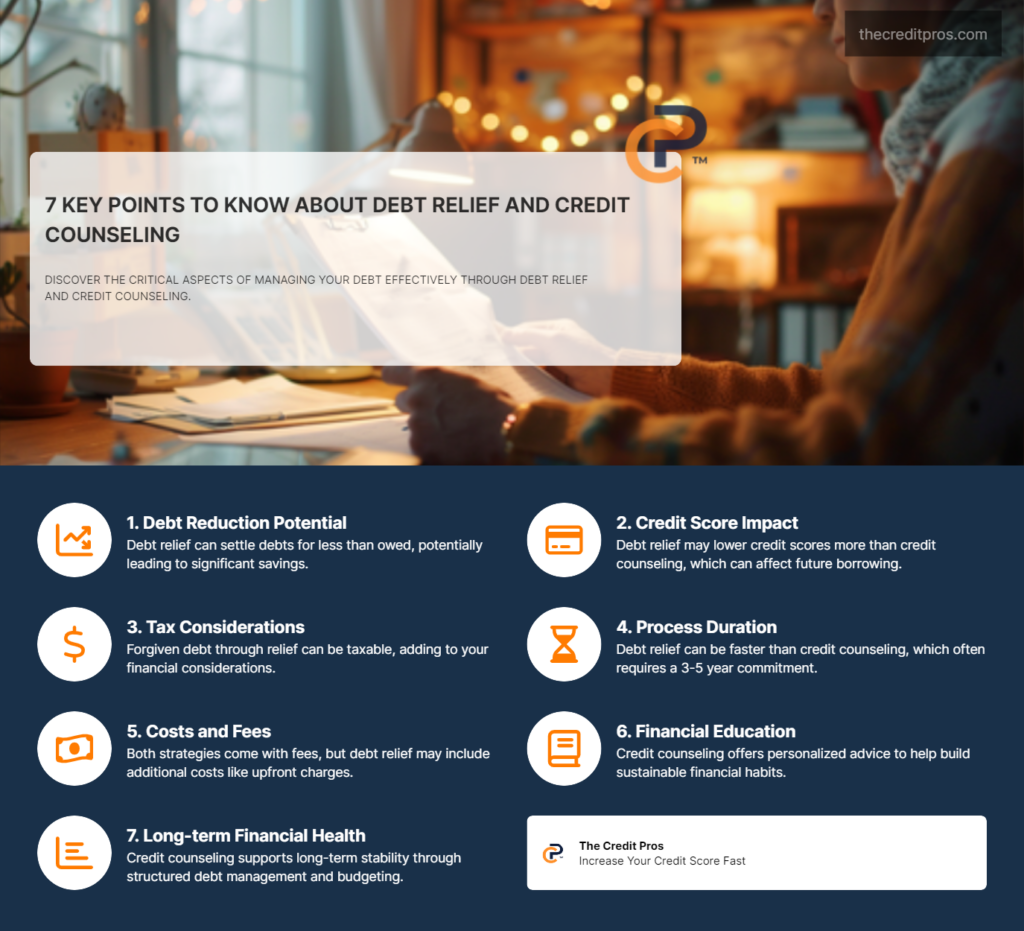Managing overwhelming debt can feel like an uphill battle, leaving many individuals searching for effective solutions. Whether it’s mounting credit card balances, personal loans, or unexpected medical bills, the stress of debt can be all-consuming. Understanding the various options for comparing debt relief and credit counseling is crucial in finding a path to financial stability.
Debt relief and credit counseling are two popular strategies, each with its own set of advantages and challenges. How do these methods differ, and which one might be the best fit for your unique situation? This article will explore the pros and cons of both approaches, offering insights into what you can expect from each. By the end, you’ll have a clearer picture of which option could help you regain control of your finances and pave the way for a more secure future.
Understanding Debt Relief
What is Debt Relief?
Debt relief, also known as debt settlement, is a financial strategy aimed at reducing the total amount of debt owed by negotiating with creditors. This process often involves a third-party debt relief company that works on behalf of the debtor to settle debts for less than the full amount owed. The goal is to provide a more manageable solution for individuals overwhelmed by debt, allowing them to pay off a portion of their debt in a lump sum or through a structured payment plan.
The debt relief process typically begins with an assessment of the individual’s financial situation, followed by the creation of a tailored plan to address their specific needs. The debt relief company will then negotiate with creditors to reach a settlement agreement. Once an agreement is reached, the debtor makes payments to the debt relief company, which in turn disburses the funds to the creditors.
Pros of Debt Relief
One of the primary advantages of debt relief is the potential for significant debt reduction. By negotiating with creditors, individuals can often settle their debts for a fraction of the original amount owed. This can provide immediate financial relief and help individuals avoid bankruptcy.
- Potential for Significant Debt Reduction: Debt relief can result in substantial savings, as creditors may agree to accept a lower amount to recover some of the debt rather than risk receiving nothing if the debtor declares bankruptcy.
- Faster Resolution Compared to Other Methods: Debt relief can be a quicker solution compared to other debt management strategies, such as credit counseling or debt consolidation. The negotiation process can lead to a resolution within a few months to a few years, depending on the individual’s financial situation and the willingness of creditors to settle.
Cons of Debt Relief
Despite its potential benefits, debt relief also comes with several drawbacks. One of the most significant disadvantages is the impact on the individual’s credit score. Debt relief is often reported to credit bureaus as a settled account, which can negatively affect credit scores and remain on the credit report for up to seven years.
- Impact on Credit Score: Settling a debt for less than the full amount owed can significantly lower an individual’s credit score. This can make it more challenging to obtain credit in the future and may result in higher interest rates on loans and credit cards.
- Possible Tax Implications and Fees: The forgiven debt amount may be considered taxable income by the IRS, leading to additional tax liabilities. Additionally, debt relief companies often charge fees for their services, which can add to the overall cost of the process.
Long-term Financial Implications
Debt relief can have lasting effects on an individual’s financial health. While it can provide immediate relief from overwhelming debt, it can also make it more challenging to rebuild credit and secure new lines of credit in the future. However, with careful financial planning and responsible credit management, individuals can work towards improving their credit scores over time.
- How Debt Relief Affects Future Financial Planning: Individuals who undergo debt relief may need to adjust their financial plans to account for the impact on their credit scores and potential tax liabilities. This may involve creating a budget, building an emergency fund, and focusing on rebuilding credit.
- Potential for Rebuilding Credit Post-Debt Relief: Although debt relief can negatively impact credit scores, individuals can take steps to rebuild their credit over time. This may include making timely payments on remaining debts, using credit responsibly, and monitoring their credit reports for errors.
Exploring Credit Counseling
What is Credit Counseling?
Credit counseling is a financial service designed to help individuals manage their debt and improve their financial health. Credit counseling agencies offer personalized financial advice, budgeting assistance, and debt management plans (DMPs) to help individuals pay off their debts in a structured and manageable way.
The credit counseling process typically begins with a comprehensive assessment of the individual’s financial situation. A credit counselor will review the individual’s income, expenses, and debts to create a customized plan. This plan may include a DMP, where the credit counseling agency negotiates with creditors to lower interest rates and consolidate payments into a single monthly payment.
Pros of Credit Counseling
Credit counseling offers several benefits for individuals struggling with debt. One of the main advantages is the personalized financial advice and education provided by credit counselors. This can help individuals develop better financial habits and make informed decisions about their finances.
- Personalized Financial Advice and Education: Credit counselors work closely with individuals to provide tailored financial advice and education. This can include budgeting tips, strategies for managing debt, and guidance on improving credit scores.
- Less Impact on Credit Score Compared to Debt Relief: Credit counseling generally has a less severe impact on credit scores compared to debt relief. Participating in a DMP may be reported to credit bureaus, but it is often viewed more favorably than settling debts for less than the full amount owed.
Cons of Credit Counseling
While credit counseling can be an effective debt management solution, it also has some drawbacks. One of the main disadvantages is the longer duration required to pay off debt. DMPs typically take three to five years to complete, which may be longer than some individuals are willing or able to commit to.
- Longer Duration to Pay Off Debt: Credit counseling often requires a longer commitment to pay off debt compared to debt relief. This can be challenging for individuals looking for a quicker solution to their financial problems.
- Possible Monthly Fees and Commitment: Credit counseling agencies may charge monthly fees for their services, which can add to the overall cost of the process. Additionally, individuals must commit to making regular payments and adhering to the DMP, which can require significant discipline and financial planning.
Long-term Financial Implications
Credit counseling can have positive long-term effects on an individual’s financial health. By providing personalized financial advice and education, credit counseling can help individuals develop sustainable financial habits and improve their overall financial well-being.
- How Credit Counseling Supports Long-term Financial Health: Credit counseling can help individuals create a realistic budget, manage their debt, and develop better financial habits. This can lead to improved financial stability and a stronger financial foundation for the future.
- Building Sustainable Financial Habits: Credit counseling emphasizes the importance of financial education and responsible money management. By learning how to budget, save, and use credit wisely, individuals can build sustainable financial habits that support long-term financial health.
Comparative Analysis: Comparing Debt Relief and Credit Counseling
Impact on Credit Score
When comparing debt relief and credit counseling, one of the most critical factors to consider is the impact on credit scores. Debt relief can significantly lower credit scores, as settled accounts are reported to credit bureaus and can remain on credit reports for up to seven years. In contrast, credit counseling generally has a less severe impact on credit scores. Participating in a DMP may be reported to credit bureaus, but it is often viewed more favorably than settling debts for less than the full amount owed.
- Recovery Time for Credit Scores Post-Process: The recovery time for credit scores can vary depending on the individual’s financial situation and the specific debt management strategy used. Individuals who undergo debt relief may experience a longer recovery period, as settled accounts can remain on credit reports for several years. In contrast, individuals who participate in credit counseling may see improvements in their credit scores more quickly, as they make consistent payments and reduce their overall debt.
Duration of the Process
The duration of the debt management process is another crucial factor to consider. Debt relief can often provide a quicker resolution compared to credit counseling. The negotiation process can lead to a resolution within a few months to a few years, depending on the individual’s financial situation and the willingness of creditors to settle. In contrast, credit counseling and DMPs typically take three to five years to complete, which may be longer than some individuals are willing or able to commit to.
- Factors Influencing the Duration of Each Process: Several factors can influence the duration of the debt management process, including the individual’s financial situation, the amount of debt owed, and the willingness of creditors to negotiate. Individuals with significant debt or multiple creditors may experience a longer process, while those with smaller amounts of debt or fewer creditors may achieve a resolution more quickly.

Cost and Fees
The cost and fees associated with debt relief and credit counseling can vary significantly. Debt relief companies often charge fees for their services, which can add to the overall cost of the process. Additionally, the forgiven debt amount may be considered taxable income by the IRS, leading to additional tax liabilities. In contrast, credit counseling agencies may charge monthly fees for their services, but these fees are often lower than those associated with debt relief.
- Hidden Fees and Additional Costs to Be Aware Of: When considering debt relief or credit counseling, it is essential to be aware of any hidden fees or additional costs. Debt relief companies may charge upfront fees, monthly fees, or a percentage of the settled debt amount. Credit counseling agencies may charge monthly fees for DMPs, but these fees are typically lower and more transparent.
Suitability for Different Financial Situations
Determining which debt management strategy is best for a particular financial situation requires careful consideration of various factors. Debt relief may be more suitable for individuals with significant debt who are struggling to make minimum payments and are at risk of bankruptcy. In contrast, credit counseling may be a better option for individuals with manageable debt who are looking for personalized financial advice and a structured plan to pay off their debts.
- Factors to Consider When Choosing Between Debt Relief and Credit Counseling: When deciding between debt relief and credit counseling, individuals should consider their overall financial situation, the amount of debt owed, their ability to make regular payments, and their long-term financial goals. Additionally, individuals should weigh the potential impact on their credit scores, the duration of the process, and any associated costs and fees.
Real-Life Outcomes
Success Stories and Lessons Learned
Real-life examples of individuals who have successfully navigated debt relief and credit counseling can provide valuable insights and lessons. For instance, individuals who have successfully completed debt relief programs often report significant reductions in their overall debt and a sense of financial relief. However, they also emphasize the importance of understanding the potential impact on credit scores and being prepared for any tax implications.
Similarly, individuals who have benefited from credit counseling often highlight the value of personalized financial advice and education. They report improved financial habits, better budgeting skills, and a clearer path to financial stability. These success stories underscore the importance of choosing the right debt management strategy based on individual financial needs and goals.
Conclusion: Navigating Your Path to Financial Stability
Choosing between debt relief and credit counseling depends on your unique financial situation and long-term goals. Debt relief offers the potential for significant debt reduction and quicker resolution but comes with the risk of a lower credit score and possible tax implications. On the other hand, credit counseling provides personalized financial advice and a structured plan to manage debt, albeit over a longer period and with less impact on your credit score.
The best approach depends on your specific needs, the amount of debt you owe, and your ability to commit to a repayment plan. Both strategies have their pros and cons, but understanding these can help you make an informed decision. The journey to financial stability isn’t one-size-fits-all; it’s about finding the right fit for you. Remember, the choices you make today will shape your financial future. Are you ready to take control and pave the way for a more secure tomorrow?


